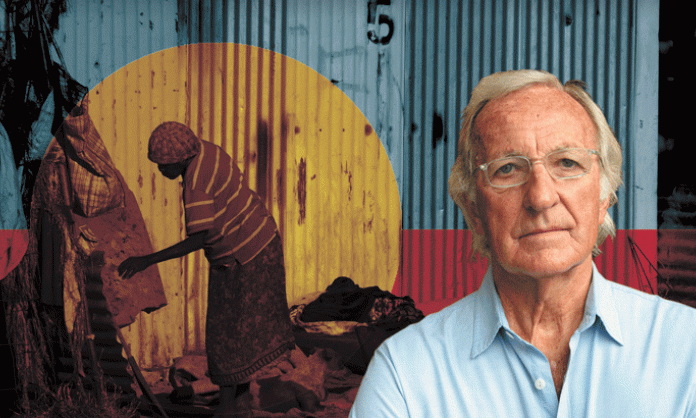On 17 January, John Pilger’s latest film, Utopia, premiered in front of 4,000 people at the Block in Redfern. The film, named after the central Australian Aboriginal community, both exposes the racism and deplorable conditions that Indigenous people continue to endure and documents their inspiring resistance, so often ignored. The following is an edited transcript of John Pilger’s speech at the event.
This film is about heroes. This film is not about victims. It’s about struggle and resistance. It brings together some of the most admirable human beings I have met. You’ve already heard from several of them.
Over the last two years, this has been the most remarkable journey for me. I knew there was in Australia – a long time ago, when I discovered it; when I discovered my own country, in the late 1960s – I knew there was an extraordinary resistance movement. All it lacked was the acknowledgment, just the acknowledgment and recognition, by the majority people of this country.
I suppose Utopia is made for them. It’s not telling you anything you don’t know. It’s not perhaps telling many of the non-Indigenous people who are here things they don’t know. But it will tell, if it can get to them, the majority in this country, many things they don’t know.
The whole notion, as I often get from non-Indigenous audiences, particularly in the media, is: “Well, look, we know all that.” Well, they don’t know all that; and if they did know all that, why haven’t they fixed it?
Why haven’t they listened to the likes of Rosalie Kunoth-Monks, who in this film says: “We never ceded anything of our land to the invaders of this country. There was no deal that we would give up our country for a lot of welfare. Where was this deal?! No deal was made! Nothing was ceded!”
No Western country has been more repeatedly condemned for the way it has treated its Indigenous people and for its racism than Australia. This is its distinction, along with a number of other distinctions. One more is that it’s the only First World country on a United Nations shame list in which an entirely preventable disease, called trachoma, has not been beaten. It’s been beaten in Sri Lanka, in Vietnam, in Morocco, relatively poor countries, but not in rich Australia.
The world is watching, the world is noticing or beginning to notice. Thinking back to 2009, when the United Nations special rapporteur, a distinguished Native American, Professor James Anaya, came to Australia, [he] went to Utopia and said, “Why is this going on? This is racist.” The reaction of the then shadow minister for Indigenous health, Tony Abbott, was, “Get a life. Don’t listen to the Victim Brigade.” Those were his words. This man is now the prime minister of Australia.
When I say to people overseas, “There is a struggle for freedom in Australia”, they look at me nonplussed. Until they see a film like this, and then they understand.
This is the issue in Australia that matters more than anything. We’re coming into a period when there will be a great deal of military propaganda. We must combat that with the fact that something like 20-30,000 Aboriginal people died fighting the invaders of their country. Set that against the 40,000 Australian soldiers who died in the Second World War, and we’re talking about the suppression of a history on an extraordinary scale.
We must stand up, not just for recognition of Indigenous soldiers in these world wars and in these colonial wars; that’s very important. We must stand up for the beginning, for those who fought so heroically on many frontiers against the invaders of this country.
More people died fighting defending Australia from its invaders than Native Americans died fighting the US cavalry at famous places like Wounded Knee and Little Big Horn. More people died in Queensland, where there was open carnage.
I hope that this film … does its job. It could only do its job as part of an extraordinary resistance, which I would like to see renewed in the way that we’ve seen it in the past. And I feel it will be.
[To find out more about the film, and for screening times, visit utopiajohnpilger.co.uk.]








